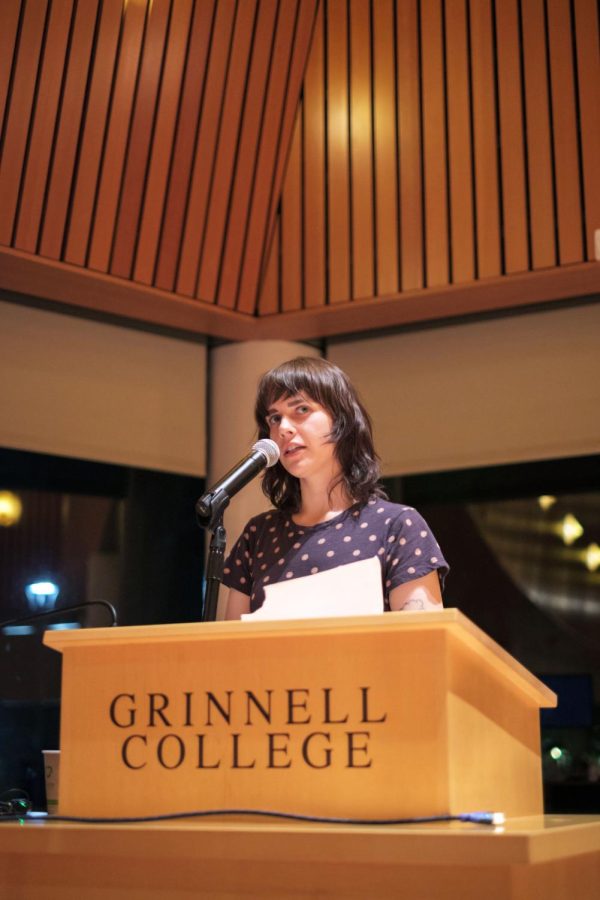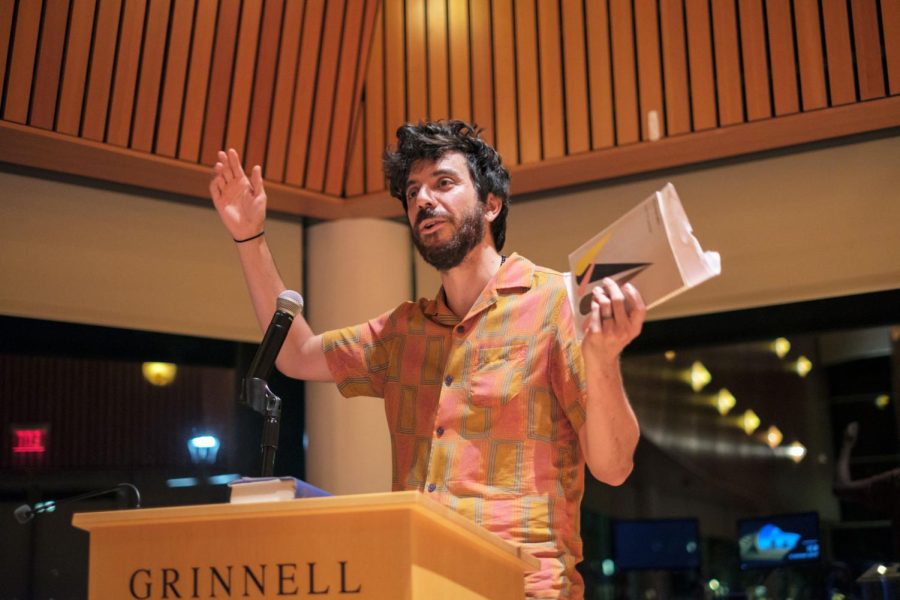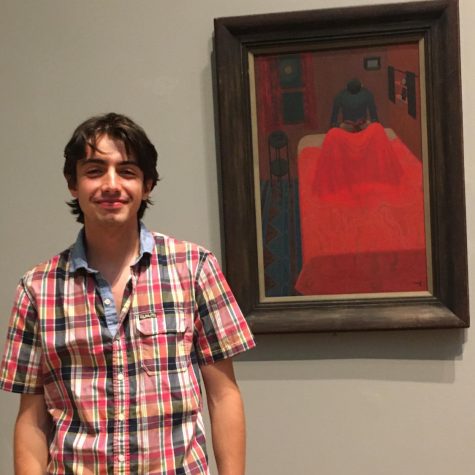“Married to my favorite poet” W@G: Paige Lewis and Kaveh Akbar
Kaveh Akbar sees poetry as one way to affect positive social change.
September 26, 2022
2022 Iowa College Media Association award winner, First Place – Best Print/Online Review
During his joint roundtable discussion with Paige Lewis on Sept. 20, Kaveh Akbar sat on top of the table, dressed vibrantly in a short-sleeve orange button-down patterned with pink and green geometric designs, gesticulating as he spoke and filling the room with his voluble presence. Lewis was more understated, remaining in their chair and speaking at a lesser volume, interweaving deep and sincere meditations about poetry with deadpan humor. The difference between the two was striking, but their connection — both personal and artistic — shone brighter.
Akbar and Lewis have each recently established themselves at the forefront of contemporary American poetry. Akbar has published two collections, “Pilgrim Bells” and “Calling a Wolf a Wolf”, edited “The Penguin Book of Spiritual Verse” and had his work featured in The New Yorker, The New York Times, Best American Poetry and elsewhere. Lewis has one book of poetry, “Space Struck”, and has had their poems in Poetry, American Poetry Review, Ploughshares, Best New Poets 2017, Gulf Coast, The Massachusetts Review and other publications. Akbar and Lewis are married, and they recently moved to Iowa City where they both teach at the University of Iowa.
The two visited Grinnell College last week to open this fall’s Writers@Grinnell series — a set of lectures given by notable current writers each semester, hosted by the English department and open to the public. The event typically consists of two parts: a roundtable discussion in the afternoon where writers have an opportunity to answer specific questions or conduct workshop exercises, and then an evening reading where they can share selections of their work.
Lewis read their poetry first on Tuesday night, after introducing themself as an “anxious person” and cracking a pun about the Greek tragedian Euripides. From their book “Space Struck”, they recited poems which felt at first contained and intimate, only to expand and reflect on a multiplicity of experiences and phenomena: animal life cycles, the city subway and the Radium Girls, to name a few.
In his introduction at the event, Writers@Grinnell Director, and Associate Professor of English, Dean Bakopoulos described Lewis’ work as “astronomical” in scope. He said, “their poems shine, burst into orbit, explode into supernovas and reassuringly glimmer at the end in ways that are unafraid. They are thrilling to read, not just because they move with an energy that feels infectious and an elegance rare in a poet’s new collection, but because Lewis’ poems also signal the arrival of a wholly new voice in American poetry. A voice wielding perhaps the rarest gift that imaginative writing can give its readers: absolute and unabashed tenderness.”

The uniqueness of Lewis’ voice mirrors the highly individual character of their poetry. “Every time I sit down to write, I’m a slightly new person, or maybe possibly radically new depending on the day. My writing tries to explore a small part of myself, a small part of something that I’m wondering about, or just [act as] an exercise in being comfortable with uncertainty. It’s an exploration in the unexpected, and not knowing is really important to me,” they said in an interview with the S&B following the event.
Lewis’ poetry is intensely personal, but that does not make it isolating or insular. They engage directly with environmental causes — most recently by volunteering at a local raptor center — and they hope that their writing can raise awareness and inspire a similar call to activism in the minds of their readers. “If someone can read my work and feel like, ‘oh, I feel that way too,’ or if it makes even one reader think about nature in a new way, or about how what they’re doing is affecting nature, I think that can be super helpful,” they said. “I’m always thinking about nature and the ways in which we are destroying it and how helpless one can feel in those moments. That definitely influences my writing, even if it’s sometimes just to say, ‘I feel helpless in this moment.’”
In his poetry, Akbar gravitates more towards religion and spirituality. After cracking an anti-joke about tomatoes that drew a few cringes, he recited some of his own poems from “The Penguin Book of Spiritual Verse.” His delivery — standing on tiptoe, wavering over the microphone, speaking in an even, charged voice — and subject matter — angels, covenants, interactions between human and divine — was spiritually complex and resonant. Bakopoulos praised Akbar’s “audacity and honesty,” and called his poems “a testament to the deeply human notion of the sublime: so open-hearted that they feel dangerous.”
Akbar was born in Tehran, Iran, and words and phrases from Farsi which he learned as a youth now pepper his poetry, where he reflects on his identity and questions what it means to be an American today.
Though their subject matter does not always overlap, like Lewis, Akbar also sees poetry as able to affect positive social change. “Each poem is one gesture, among a lifetime of gestures, that can apply force against colonial systems and hierarchies. That collectively might move us towards the horizon of a better future,” he said. He highlighted the poet’s role in society as someone able to “get beneath [the reader’s] knowing and change the way in which someone encounters language, which is inherently political.”
Akbar and Lewis oozed collaboration at the event on Tuesday: they joked around together, riffed off each other and complemented one another’s poems. That spirit of collaboration is also fundamental to both poets’s work.
“We were writing poems before we met, but we got very, very serious about poetry after meeting,” Lewis said. “We decided that one of our love languages would be writing a poem every day and sharing it with one another for a month. That was an awesome reward: being able to share your work with someone that you really care about and then immediately having them talk about what they thought. There are certain images that ended up popping up in our poems that were like, ‘Oh, wait, that’s in one of my poems because we both had similar experiences.’ But there’s also sometimes we’ll claim experiences, like we’ll see something say, ‘Oh my God, that’s mine. I’m going to write a poem about that. You can’t write a poem about that.’ We’re always kind of inspiring each other and encouraging each other to keep exploring new forms of writing, or just new ideas. I’m super lucky to be able to be married to my favorite poet.”
There are five remaining Writers@Grinnell events this fall. Next up, debut novelists Belinda Huijuan Tang and Sarah Thankam Mathews come to Grinnell on Thursday, Sept. 29. There will be a roundtable discussion at 4:15 p.m. in HSSC room S1325, followed by an 8 p.m. reading in the Joe Rosenfield Center, room 101.



















































Odile Ayral • Oct 11, 2024 at 10:52 am
I suppose Kosinski would not use “they” as a singular if Lewis had not requested it, but in this case it is particularly confusing because the article is about two poets. Did THEY collaborate on one book? At first, I thought they did, then reading along, I realized I was mistaken. At least, I was glad to read that reference to Akbar was HE because if it had been THEY, the entire article would have been unreadable.